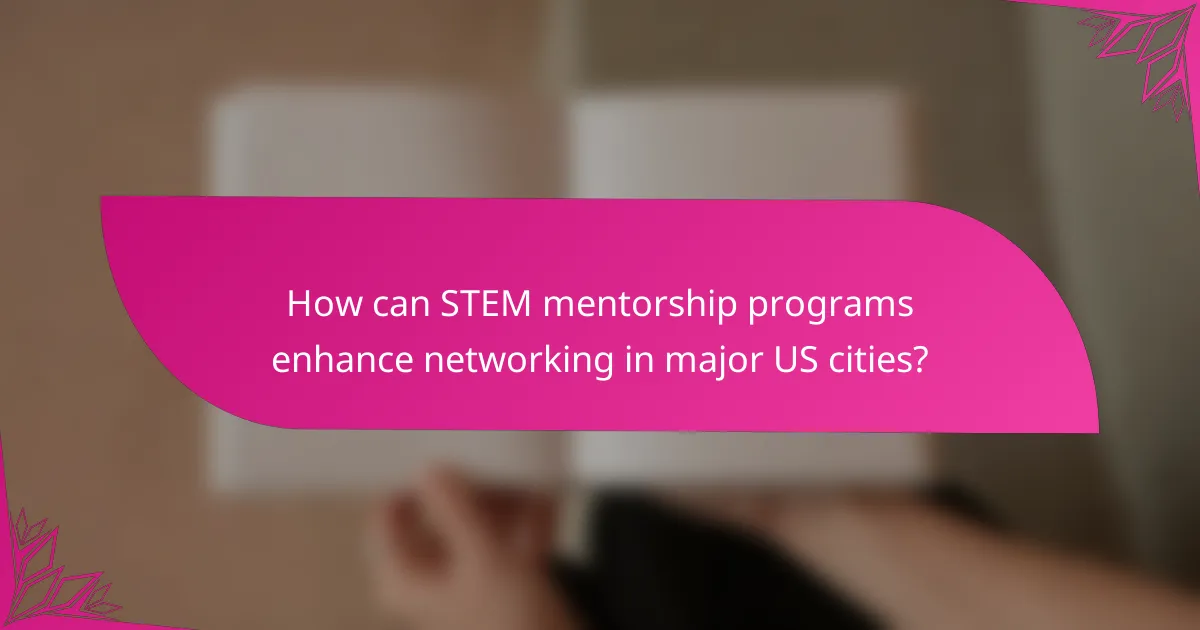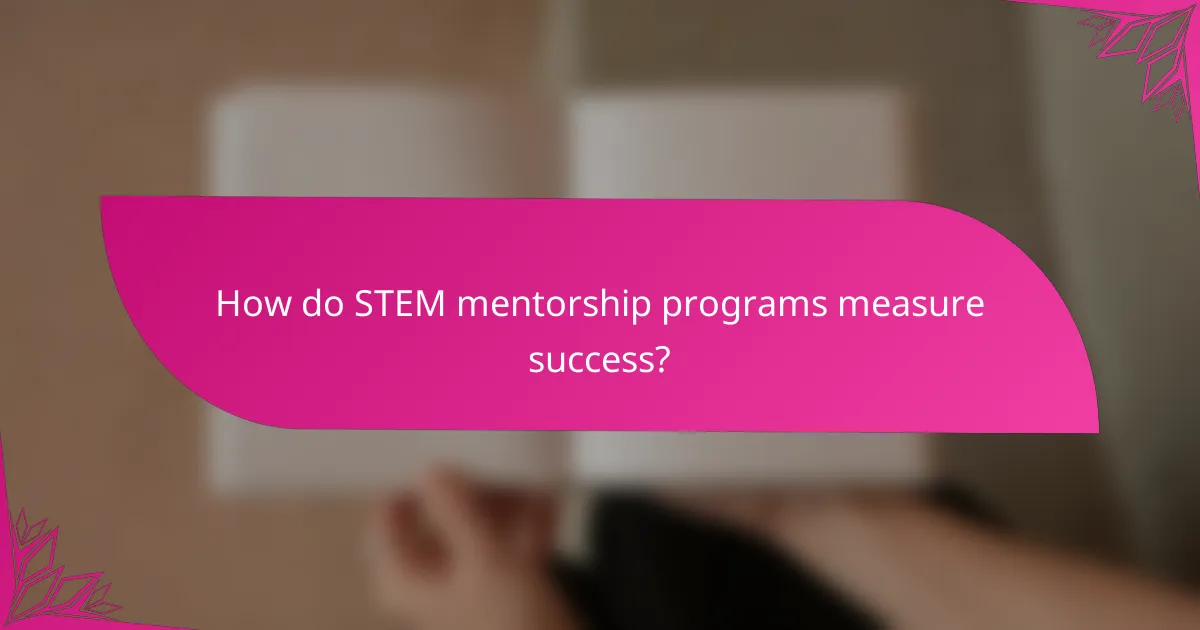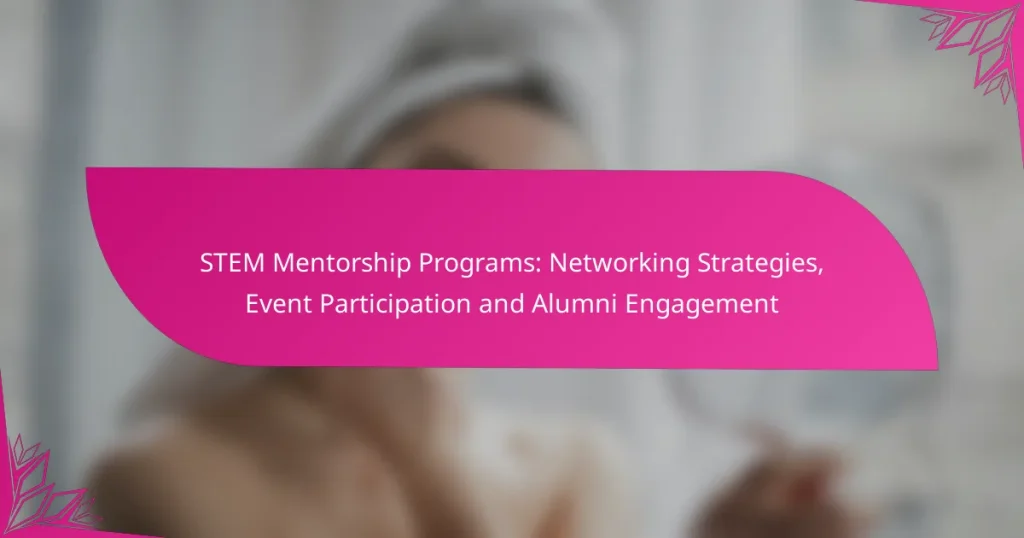STEM mentorship programs play a crucial role in fostering networking opportunities among professionals, students, and alumni, particularly in thriving tech and science hubs. By participating in these programs, individuals can build meaningful connections that may lead to job opportunities and collaborations. Engaging effectively in mentorship events and maintaining alumni relationships can further enhance these benefits, providing valuable insights and career pathways in the STEM fields.

How can STEM mentorship programs enhance networking in major US cities?
STEM mentorship programs significantly enhance networking opportunities by connecting professionals, students, and alumni within the field. These programs facilitate relationships that can lead to job opportunities, collaborations, and knowledge sharing, particularly in major US cities where the tech and science industries thrive.
Networking events in New York City
New York City hosts numerous networking events tailored for STEM professionals, including conferences, workshops, and meet-and-greets. These events often attract industry leaders and innovators, providing attendees with valuable insights and connections. Participating in events like the NYC Tech Meetup or the New York Science Festival can help individuals expand their professional networks.
When attending these events, it’s beneficial to prepare an elevator pitch and bring business cards. Engaging in discussions and following up with contacts afterward can solidify new relationships.
Online networking platforms like LinkedIn
Online platforms, particularly LinkedIn, play a crucial role in STEM networking by allowing professionals to connect, share insights, and showcase their work. Users can join industry-specific groups, participate in discussions, and follow companies to stay updated on trends and job openings. Creating a strong profile with relevant skills and experiences enhances visibility to potential mentors and employers.
To maximize LinkedIn’s potential, regularly post updates, share articles, and engage with others’ content. This active participation can lead to meaningful connections and opportunities in the STEM field.
Local STEM meetups in San Francisco
San Francisco is known for its vibrant tech scene, and local STEM meetups provide excellent networking opportunities. Groups like SF Tech and Women Who Code host regular meetups that foster collaboration and learning among professionals. These gatherings often include talks from industry experts, hands-on workshops, and networking sessions.
Joining these meetups can help individuals meet peers and mentors in a more informal setting. It’s advisable to attend consistently and actively participate in discussions to build rapport within the community.

What are effective strategies for participating in STEM mentorship events?
Effective strategies for participating in STEM mentorship events include thorough preparation, proactive engagement, and follow-up communication. These approaches can enhance your networking experience and foster meaningful connections with mentors and peers.
Preparation tips for STEM conferences
Before attending a STEM conference, research the event schedule, speakers, and participating organizations. Identify key sessions that align with your interests and goals, and prepare questions or topics to discuss with mentors. Having a clear plan will help you maximize your time and interactions.
Additionally, consider creating a professional portfolio or resume that highlights your skills and achievements. Bring multiple copies to share with potential mentors. Dress appropriately for the event, as first impressions can significantly impact networking opportunities.
Best practices for engaging with mentors
When engaging with mentors, start by introducing yourself clearly and confidently. Share your background and interests, and express why you are seeking mentorship. Be specific about what you hope to gain from the relationship, whether it’s guidance on a project or career advice.
Active listening is crucial; show genuine interest in their insights and experiences. Follow up with a thank-you email after your conversation, reiterating key points discussed and expressing appreciation for their time. This reinforces your commitment and keeps the connection alive.

How can alumni engagement improve STEM mentorship outcomes?
Alumni engagement can significantly enhance STEM mentorship outcomes by fostering connections between current students and experienced professionals. These relationships provide valuable insights, networking opportunities, and potential career pathways that can lead to successful outcomes in STEM fields.
Alumni networking events in Chicago
Chicago hosts various alumni networking events tailored for STEM professionals, providing a platform for interaction and collaboration. These events often include panel discussions, workshops, and informal meet-and-greets, allowing participants to share experiences and build connections.
To maximize the benefits of these events, attendees should prepare by researching speakers and topics in advance. Engaging actively during discussions and following up with new contacts afterward can lead to meaningful mentorship relationships.
Success stories from alumni in STEM
Many alumni in STEM have leveraged their networks to achieve significant career milestones. For instance, a former engineering student may have connected with a mentor who guided them through the job application process, resulting in a position at a leading tech company.
These success stories often highlight the importance of mentorship in navigating challenges and seizing opportunities. Alumni who actively participate in mentorship programs frequently report increased job satisfaction and career advancement, demonstrating the tangible benefits of alumni engagement in STEM fields.

What criteria should be considered when selecting a STEM mentorship program?
When selecting a STEM mentorship program, consider factors such as the program’s reputation, success rates, and the qualifications of the mentors involved. These criteria can significantly impact the quality of the mentorship experience and the potential outcomes for mentees.
Program reputation and success rates
The reputation of a STEM mentorship program often reflects its effectiveness and the satisfaction of past participants. Look for programs that have received positive reviews from alumni and have established connections with reputable organizations in the STEM field.
Success rates can be measured by the number of mentees who achieve their goals, such as securing internships, jobs, or further education. Programs that track and share these outcomes can provide valuable insights into their effectiveness.
Mentor qualifications and backgrounds
Assessing mentor qualifications is crucial for ensuring a productive mentorship experience. Look for programs that feature mentors with relevant academic backgrounds, professional experience, and a track record of success in their fields.
Additionally, consider the diversity of mentors available. A variety of perspectives can enrich the mentorship experience, helping mentees to navigate different career paths and challenges within the STEM landscape.

How do STEM mentorship programs measure success?
STEM mentorship programs measure success through various metrics, including participant feedback, career advancements, and alumni engagement. These indicators help assess the effectiveness of the mentorship experience and its impact on participants’ professional growth.
Participant feedback and surveys
Collecting participant feedback through surveys is a primary method for evaluating the success of STEM mentorship programs. Surveys typically assess satisfaction levels, perceived value of mentorship, and areas for improvement. Feedback can be gathered at multiple stages, such as after events or at the conclusion of the mentorship period.
For effective surveys, consider using a mix of quantitative ratings and open-ended questions. This approach allows participants to express specific thoughts while providing measurable data. Aim for a response rate of at least 60% to ensure the feedback is representative.
Career advancement statistics
Career advancement statistics are crucial for measuring the long-term impact of STEM mentorship programs. Metrics such as job placement rates, promotions, and salary increases can provide insights into how mentorship influences career trajectories. Tracking these statistics over time helps identify trends and areas where mentorship can be enhanced.
To effectively gather this data, establish a follow-up process with alumni at regular intervals, such as annually. This can include surveys or interviews to capture their career progress and the role mentorship played in their development. Aim for a clear correlation between mentorship participation and positive career outcomes to demonstrate success.

What emerging trends are shaping STEM mentorship programs?
Emerging trends in STEM mentorship programs are increasingly focused on virtual engagement, diversity, and the integration of technology. These trends aim to enhance accessibility, foster inclusive environments, and leverage digital tools to improve mentorship effectiveness.
Virtual mentorship opportunities
Virtual mentorship has become a key trend, allowing mentees and mentors to connect regardless of geographical barriers. This flexibility enables participants to engage in more frequent and diverse interactions, often through video calls, webinars, and online forums.
To maximize the benefits of virtual mentorship, consider setting clear goals and expectations for each session. Regular check-ins and feedback loops can also help maintain engagement and accountability.
Increased focus on diversity and inclusion
STEM mentorship programs are increasingly prioritizing diversity and inclusion to create equitable opportunities for underrepresented groups. This focus not only enriches the mentorship experience but also fosters innovation by bringing diverse perspectives into the field.
Organizations can enhance diversity by actively recruiting mentors and mentees from various backgrounds and implementing training programs that address unconscious bias. Establishing partnerships with community organizations can also broaden outreach efforts.
Integration of technology in mentorship
The integration of technology in mentorship programs is transforming how relationships are built and maintained. Tools such as mentorship platforms, mobile apps, and data analytics are being used to match mentors and mentees more effectively and track progress over time.
When adopting technology, ensure that the tools are user-friendly and accessible to all participants. Providing training on how to use these technologies can help maximize their effectiveness and improve overall engagement in the mentorship process.


